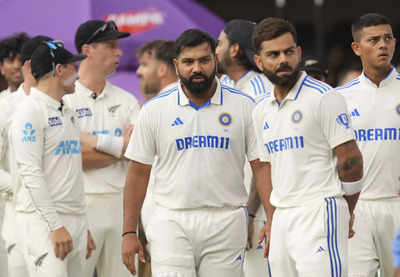Over reliance on lower middle order or top order failure? What cost India first Test series defeat in more than two years | Cricket News


NEW DELHI: New Zealand putting a crack to India’s citadel in Test cricket drew criticism from all quarters, with cricket pundits firmly attributing the hosts’ poor batting performance to their first series defeat at home since 2012.
But this was not the first time that India’s batters struggled to make an impact, whether in home or away series. The clamour intensified as India’s unbeaten streak of 18 home series wins came to an end.
The batters, who mastered the art of playing spin, were taken aback by Kiwi left-arm spinner Mitchell Santner on Pune rank turner with 13 wickets in the match.
India’s top order in Test cricket boasts of some of the best batters in the world, who can be a nightmare for any bowling lineup on a given day. However, their dominance, once a key strength of the team, appears to be waning with each series.
Yet, India have been able to produce results in their favour courtesy of the ability of the lower middle order, which bail the team out of trouble waters whenever needed.
Rohit, Kohli’s slump in form raises alarms
Since 2022, both Rohit Sharma and Virat Kohli have faced a dip in their form in Test cricket. Rohit has accumulated 1,194 runs in 20 matches (35 innings) at an average of 34.11, while Kohli has managed 1,181 runs in 19 matches (33 innings) with a slightly better average of 35.78. Both players, known for their remarkable consistency in the past, have seen their batting performances fall short of expectations, struggling to convert starts into big scores.
Former India cricketer Aakash Chopra has also raised concerns about Kohli’s form. He pointed out that Kohli has scored just two centuries in Test cricket over the past five years, with one of those coming on a flat batting pitch in Ahmedabad against Australia.
Yashasvi Jaiswal is the only silver lining at the top order, who since his debut against West Indies last year is consistent with the bat. He also became the youngest Indian to reach 1,000 Test runs in a calendar year, a milestone he achieved during the second Test against New Zealand in Pune.
Lower middle order’s rescue acts
India’s lower middle order always rose to the occasion with Ravichandran Ashwin, Ravindra Jadeja and Axat Patel making the bulk of runs. Their ability to rescue the team in challenging situations and snatch victories from the jaws of defeat has been instrumental in maintaining India’s winning streak.
Ashwin and Jadeja forged a crucial 199-run partnership against Bangladesh in Chennai when India was reeling at 144/6. Ashwin also contributed in a 114-run stand with Axar Patel against Australia in New Delhi, pulling India out from 139/7.
Ashwin and Kuldeep Yadav added 92 valuable runs against Bangladesh in Chattogram when the team was struggling at 293/7. Jadeja and Axar’s 88-run partnership in Nagpur against Australia came when India was down at 240/7.
Dhruv Jurel and Kuldeep’s 76-run stand against England in Ranchi lifted India from 177/7, while Ashwin and Shreyas Iyer’s unbeaten 71-run partnership against Bangladesh in Mirpur saved the day as India recovered from 74/7 while chasing 145. These crucial contributions from the lower middle order have often turned the tide in India’s favour.
What went wrong for India against Kiwis?
The lower middle order which has been at the forefront for India for quite some time endured a rare failure against New Zealand in the first two Tests of the three-match series, resulting in India’s first series loss for more than two years.
Since their defeat to South Africa in the 2021-2022 series, India had played eight Test series, winning six and drawing two.
What Ashwin and Jadeja have done with the bat was not originally the primary role they were brought into the team for. However, their consistent impact with the ball has been pivotal in maintaining India’s home winning streak for 12 years, ensuring crucial victories across multiple series.
Ashwin, who made his debut in November 2011, and Jadeja, who first played a Test in December 2012, combined to form a formidable partnership.
In home Tests where they have played together, Ashwin has claimed 326 wickets in 55 matches, while Jadeja has taken 225 scalps in 47 games.
But the pair failed to capitalize on a spin-conducive surface that contributed to India’s first Test series defeat at home in over a decade. However, Rohit stood by his spin duo saying it’s the responsibility lies with all of us to get the Test wins, not just the two guys.
“They know (about) that. There’s too much expectation on those two guys,” Rohit said after the series loss. “Every game they play, they are expected to take wickets, run through the (opposition) team and win Test matches for us. I don’t think that is fair.”







